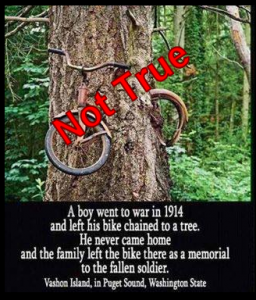Have you seen this little novelty? It’s a real picture of a real place, where a bicycle is embedded in a tree. That part is true. What’s NOT true is the caption underneath it. But, people don’t seem to care that it’s not true, because it has a bittersweet, tragic ring to it (and could arguably be used as anti-war propaganda).
If you find someone who has shared this picture online, and read comments people post about it, you’ll find that commenters essentially fall into two categories:
1. Those who recognize that the caption can’t be accurate, either because that particular bicycle was manufactured long after 1914, or because the placement of the bike high above the ground doesn’t match the description of how it happened, or because the boy small enough to ride that little bike was way too young to be going off to war.
2. Those who don’t care that it’s not true, get mad at those who point out that it’s false, and insist that it’s a “fable.”
It’s not a fable. It’s a lie. There’s a difference. Let’s talk for a second about fables. You know Aesop, right? The fable of the fox and the grapes? The ant and the grasshopper? The town mouse and the country mouse? You know what they all have in common?
It’s obvious that they’re made up stories, and are not intended to fool anyone into thinking they actually happened. In case you didn’t notice, the characters are all animals! What? You mean there really wasn’t a tortoise who challenged a hare to a race?
Uh…no.
Why does this distinction matter? Because in our “postmodern” mentality, stories are becoming more important than reality. Because honesty is becoming less and less important in society at large. Because people are more concerned with their own viewpoint than with truth. Or even worse, we’re more concerned about our online presence and popularity than with the truth. Recently I read an article in which a journalist was quoted as saying that the news media are so eager to get a story online first that it’s becoming the standard mode of operation to post a story, then do the fact checking, and then do retractions and revisions on incorrect information. Apparently, having a story is more important than having a true story.
It reminds me of a friend of mine who, back during the “Occupy” movement, shared a photo of a woman with a gaping wound in her cheek, and a caption that claimed police brutality against the protesters. Well, it only took about 15 seconds of researching to determine that the photo and the caption were 100% unrelated. In other words, it was a lie. A lie that had been shared over a quarter of a million times on Facebook.
I hate to break it to you, but I don’t care what your viewpoint is (even if your viewpoint matches mine!) – your viewpoint is not more important than the truth, and if you have to lie to support your viewpoint, then I’m not even interested in hearing what you have to say.
If you have something you’d like to say, find a true story that backs up your viewpoint. Or tell a fable that’s clearly a fable. Don’t mix and match, because there’s already too much confusion in this world of ours, and people already don’t know who they can trust.
Jesus said, “Let your yes be yes and your no be no.” And He – the master storyteller – never left his listeners in doubt about whether His story was a “once upon a time” or not.
